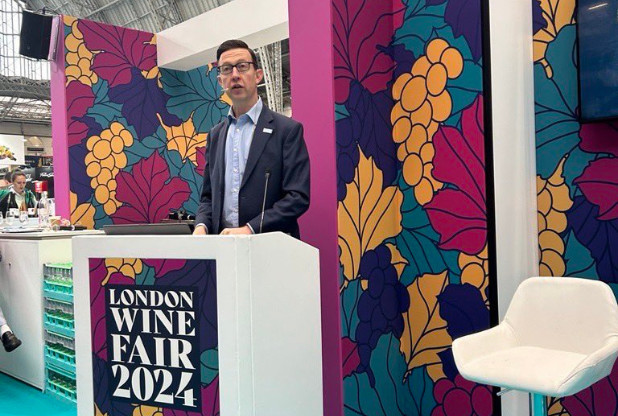Homeland News
by James Bailey
Published: May 21, 2024
At the 2024 London Wine Show, Miles Bell, CEO of the Wine & Spirit Trade Association (WSTA), gave a comprehensive 'State of the Nation' speech, reflecting on the past four and a half years of the UK wine market under various government administrations and outlining the sector's needs from the incoming government.
Major economic contributions
Bell (pictured) began by emphasizing the significant economic impact of the UK wine industry, the world's second-largest wine importer by volume and value. In 2023, UK businesses imported more than 1.6 billion bottles of wine, contributing £35 billion in economic activity and £8.9 billion in gross value added to the UK economy, supporting almost 200,000 jobs across the supply chain.
Of those 1.6 billion bottles, a large proportion (440 million litres) were imported in bulk and bottled in the UK. Last year, more wine was bottled in the UK than annual production in Bordeaux, according to Bell.
The government's mixed record
Reviewing the government's performance since the 2019 election, Bell described it as a “mixed bag”, with some positive outcomes, but also many policies that threaten the economic sustainability of UK wine businesses. Although he acknowledged the challenges posed by Brexit, he credited the government with removing VI-1 import certificates, which had previously imposed costly and unnecessary requirements on wine imports.
Regulatory challenges
Bell criticized the recent review of alcohol tax duties in the UK, which moved from a volume-based to a strength-based system, which has complicated tax calculations for a wide range of wines on the market. He called for the temporary easement, which simplifies customs duties on wine between 11.5 and 14.5% abt, to be made permanent to avoid unnecessary administrative burdens.
“We estimate there are in excess of 100,000 different types of wine on the UK market, and probably many more when taking into account the wines on reserve,” Bell said.
“Under the previous system, paying excise duty was simple. All a company needs to know is whether the wine is still, fortified or sparkling and apply one of three amounts to each bottle,” he added.
When the fee changes are fully implemented in February 2025, businesses will have to calculate fees on each SKU.
“And to what end?” Bill continued. “Does it really make sense to dogmatically cling to the new rules while burdening businesses with unnecessary bureaucracy and administrative burdens – for marginal gain to the Treasury? Of course not, but that is a policy this government seems intent on pursuing.”
Environmental and social responsibility
Highlighting the industry's commitment to environmental sustainability, Bell called for immediate reforms to the packaging recycling feedback system (PRNs) and improvements to glass sorting and separation. He also stressed the importance of social responsibility, urging the industry to voluntarily provide ingredient and nutrition information on labels to avoid future regulatory mandates.
Future government relations
Looking to the future, Bell set out several “demands” for the next government, stressing the need for a collaborative approach to policy development that recognizes the economic importance of the wine sector. He called for fair and proportionate taxes and regulation, and stressed the need to avoid regulatory divergence within the UK and between the UK and the EU to maintain smooth trade flows.
Conclusion
Bill concluded by emphasizing the WSTA’s commitment to ensuring the voice of the UK wine and spirits sector is heard both locally and internationally. He stressed the importance of working closely with the government to promote economic growth, improve environmental outcomes, and enhance social responsibility in the industry.
“As someone said to me recently, it's not easy to trade in the UK, but it's also the most important market to be in,” Bell said.


